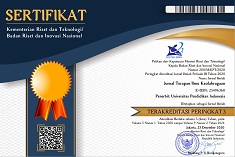The Effect of Audio-Visual-Based Imagery Training on Improving Smash Precision in Volleyball Ads
Abstract
The purpose of this study was to examine the effect of audio-visual-based imagery training on smash accuracy in volleyball. A total of 14 volleyball players from SA Club, Sukatani, participated as the study sample. This study employed a randomized pretest-posttest control group design, with participants divided into two groups: an experimental group, which received imagery training using virtual reality, and a control group, which did not. The hypothesis test results indicated a significant effect, with t = -3.488 and p = 0.013 (< 0.05), leading to the rejection of H₀. This finding suggests that audio-visual-based imagery training significantly improved smash accuracy in volleyball. Furthermore, the experimental group showed greater improvement compared to the control group, with an average score of 121.22, while the control group scored 86.87. These results highlight the benefits of integrating imagery training with virtual reality into volleyball training programs. The findings suggest that incorporating this technology can enhance training effectiveness and contribute to the advancement of sports science, particularly in volleyball performance development.
Keywords
Full Text:
PDFReferences
Abidin, R. (2016). Pengertian Virtual Reality dan Perbedaanya dengan Augmented Reality. [Online]. Diakses dari: https://teknojurnal.com/pengertian-virtual-reality-dan-perbedaanya-dengan-augmented-reality/
Anandita, F.P. (2010). Mengenal Olahraga Voli. Bogor: Quadra
Bell, K. (2011). Berfikir Juara. Jakarta: Satlak Prima Utama Muda
Firmansyah, H. (2011). Perbedaan Pengaruh Latihan Imagery dan Tanpa Latihan Imagery Terhadap Keterampilan Senam dan Kepercayaan Diri Atlet. Jurnal Olahraga Prestasi
Holmes, P. S., & Calmels, C. (2008). "A Neuroscientific Review of Imagery and Observation Use in Sport." Journal of Motor Behavior, 40(5), 433–445.
Komarudin (2015). Psikologi Olahraga. Bandung: PT. Remaja Rosdakarya
asuha, M. (2014). Pengaruh Model Pembelajaran Terhadap Keterampilan Teknik Dasar Bola Voli. Skripsi, Universitas Pendidikan Indonesia.
Nurhasan & Hasanudin (2014). Tes dan Pengukuran Keolahragaan. FPOK, UPI, Bandung.
Omarfauzze, dkk. (2009). The Effectiveness of Imagery and Coping Strategies in Sport Performance. European Journal of Social Sciences , 9, 97-108
Satriya, dkk. (2014). Teori Latihan Olahraga. FPOK, UPI, Bandung.
Smith, D., Wright, C. J., Cantwell, C., & Ross, D. (2018). "The Effect of a Virtual Reality-Based Imagery Intervention on Golf Putting Performance." Psychology of Sport and Exercise, 39, 41–50.
Sofian, O. F. (2009). The Effectivemess of Imagery and Coping Strategies in Sport Performance. European journal of social science
Suherman, A & Indri, N. (2014). Modul Statistika. FPOK, UPI, Bandung.
Subroto dan Yudiana. (2010). Permainan Bola Voli. Bandung: FPOK Universitas Pendidikan Indonesia.
Sukamto. (2013). Pengaruh Latihan Imagery Terhadap Peningkatan Keterampilan Lay Up Shoot Permainan Bola Basket Siswa Peserta Ekstrakulikuler Bola Basket SMA N 1 Bantul. [Online]. Diakses dari: http://eprints.uny.ac.id/16246/1/Sukamto_NIM.09601244051.pdf.
Suryono. (2008). Pengaruh Mental Imajery Bagi Atlet Dalam Meraih Prestasi. [Online]. Diakses dari : http://suryanto.blog.unair.ac.id/2008/01/07/pengaruh-mental-imagery-bagi-atlet-dalam-meraih-prestasi/.
Wikipedia. (2016). Virtual Reality. [Online]. Diakses dari: https://id.wikipedia.org/wiki /Realitas_maya.
Wright, D. J., Wood, G., & Holmes, P. S. (2020). "Revisiting the Place of Movement-Related Imagery in the Motor Imagery Literature: A Commentary on Simonsmeier et al. (2020)." Perspectives on Psychological Science, 15(4), 965–968.
Yunus, M (1992). Olahraga Pilihan Bola Voli. Jakarta: Departemen Pendidikan dan Kebudayaan.
DOI: https://doi.org/10.17509/jtikor.v9i1.81891
Refbacks
- There are currently no refbacks.
Copyright (c) 2025 Ujang Supriatna, Surdiniaty Ugelta, Tian Kurniawan

This work is licensed under a Creative Commons Attribution-NonCommercial-ShareAlike 4.0 International License.





